As winter approaches and temperatures drop, many of us rely on our heating systems to keep our homes cozy and comfortable. However, you might wonder if your heater could be contributing to health issues like dry skin, irritated sinuses, or even flu-like symptoms. TrueTemp HVAC is here to address your concerns and offer solutions to ensure your heating system supports your health, not hinders it.
Understanding How Heating Can Impact Health
- Dry Indoor Air: One of the most common issues during the heating season is the significant drop in indoor humidity levels. Heaters can strip the air of moisture, leading to dry air that can irritate your skin, eyes, throat, and nasal passages. This dryness can exacerbate asthma and allergies, making you feel sick.
- Circulation of Allergens: If your heating system uses ducts, it can circulate dust, pet dander, and other allergens throughout your home. These allergens can trigger respiratory problems and aggravate allergy symptoms, contributing to a feeling of illness.
- Carbon Monoxide Risks: Fuel-burning heaters, if not properly maintained, can produce carbon monoxide—a colorless, odorless gas that can be deadly at high levels and cause headaches, dizziness, and other flu-like symptoms at lower levels.
- Mold and Bacteria Growth: Heating systems, especially those involving humidifiers or poorly maintained units, can become breeding grounds for mold and bacteria. When dispersed into the air, these can lead to respiratory issues and other health problems.
How to Use Your Heater Without Getting Sick
1. Maintain Proper Humidity Levels: Using a humidifier in conjunction with your heating system can help maintain healthy indoor humidity levels (30-50%). This prevents the air from becoming too dry and helps protect your mucous membranes from irritation.
2. Regular HVAC Maintenance: Ensure your heating system and any associated equipment, like humidifiers and air filters, are cleaned and serviced regularly by a professional from TrueTemp HVAC. This will help keep your system free of allergens and pathogens and ensure it’s working efficiently.
3. Install Carbon Monoxide Detectors: If you use a fuel-burning heater, installing carbon monoxide detectors in your home is crucial. These should be placed near sleeping areas and checked regularly to ensure they are functioning properly.
4. Use High-Quality Air Filters: Upgrade to high-efficiency particulate air (HEPA) filters to trap finer particles and allergens. Change these filters as recommended or more frequently if you have pets or a high dust environment.
5. Ensure Good Ventilation: While it’s tempting to keep your home tightly sealed during winter, it’s important to ensure adequate ventilation. Periodically open windows to allow fresh air to circulate and consider using exhaust fans to help expel stale air.
6. Clean Ductwork: If your home has ducted heating, have the ductwork professionally cleaned to remove dust build-up and potential mold spots. This helps ensure that the air blowing through your vents is clean and healthy.
TrueTemp HVAC’s Commitment to Your Health
At TrueTemp HVAC, we understand that your comfort at home is deeply connected to your health. Our team of experts is dedicated to providing solutions that not only heat your home efficiently but also enhance your indoor air quality. From installing advanced humidifiers to performing thorough cleanings and safety inspections, we’re here to ensure that your heating system is a source of comfort, not concern.
Conclusion
While your heater is essential for comfort during the cold months, it’s important to use it wisely to avoid health issues. By taking proactive steps to manage indoor air quality and maintain your heating system, you can enjoy a warm, comfortable, and healthy home environment all winter long. Contact TrueTemp HVAC today to learn more about our heating solutions and services designed to keep you healthy and warm.
